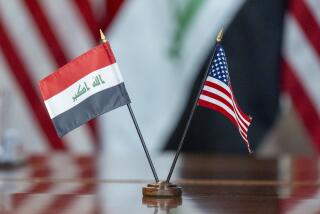Iraq Bomber Had Half-Ton of Explosives
- Share via
BAGHDAD — Authorities revealed Sunday that the blast that killed 20 people -- possibly including two U.S. citizens -- outside the headquarters of the U.S.-led occupation was set off by a suicide bomber in a truck laden with 1,000 pounds of Soviet-made plastic explosives.
The bombing dimmed the hopes of those who expected last month’s capture of Saddam Hussein to improve security in Iraq and reduce the number of deadly attacks.
It also underscored the challenges faced by the United States as it attempts to lure other countries, foreign investors and private contractors to join the reconstruction effort.
U.S. officials said they were still trying to determine if Americans were among the dead.
“We have indications that some of those killed were American citizens,” said Brig Gen. Mark Kimmitt, a military spokesman. “Many of the bodies, as you might imagine, because of the nature of the crime, we have not been able to determine their nationality, nor their names.”
Another military official said early reports of two American fatalities were based on scraps of clothing found at the scene that resembled uniforms worn by U.S. contractors.
U.S. troops and American workers here have rarely been killed in suicide car bombings. Previous attacks have taken their heaviest tolls on Iraqi civilians and police officers.
Officials believe the suicide bomber drove a small pickup truck or SUV within 15 yards of a military checkpoint at the front gate of Hussein’s former Republican Palace.
The bomber “may have inadvertently triggered it himself, or he may have felt that because of the security he could not penetrate the checkpoint” and decided to detonate, said Col. Ralph Baker, commander of the 2nd Brigade of the 1st Armored Division, which guards Baghdad’s so-called Green Zone.
Most of the deaths occurred in the busy intersection outside the complex, where more than a dozen cars and a city bus were destroyed, Baker said.
At least 60 people were wounded, including many Iraqi workers on the way to their jobs inside the Green Zone.
“This act of terrorism will not deter us from moving forward and building a stable, democratic and free Iraq,” said Hamid Kafai, a spokesman for the U.S.-appointed Iraqi Governing Council, which is based inside the complex. “This terrorist act is another stain on Saddam’s regime and his terrorist allies, be they local or foreign.”
By Sunday afternoon, U.S. investigators were sifting through the debris as workers in protective gloves and masks carried out body bags.
The attack frightened many Iraqi workers, who are exposed to considerable risk when they go to work in the Green Zone.
Every day, when he crosses the Republic Bridge to wash cars, said Jassim Ahmed, “my heart shrinks.”
After the bombing, which he witnessed as he approached the entrance Sunday, he swore he’d never return. “If they tell me that the Kaaba itself is there, I will not go back,” said Ahmed, referring to the stone structure in Mecca, Saudi Arabia, that is the holiest site in Islam, in whose direction Muslims must pray.
Abbass Kinani, 21, has been the envy of his friends for seven months because he worked in the American gym in the Green Zone. He earned the equivalent of $5 a day, got to share meals with his supervisors at the soldiers’ canteen and pocketed gifts from the United States, including a portable CD player.
Seven of his co-workers were injured in the explosion. “Tomorrow I’ll go in and return my badge,” Kinani said Sunday afternoon. “No more.”
Several workers said they did not have a choice. “We have to work with the Americans,” said Abbas Kadhum, 27, a resident of Baghdad’s Sadr City slum. “They have a system: Either you work with them or you starve.”
Kadhum, who makes $7 a day filling sandbags in the zone, tried to dismiss the mayhem. “We are getting used to explosions,” he said. “We were raised with explosions, all these wars.”
His brother acknowledged the risks. “If we quit working, we’ll die of hunger,” he said. “We’re intimidated, we’re afraid, but we have to keep working.”
At dusk, the blast scene was ringed with Iraqis desperate for news of their relatives who worked in the zone. The blast flared tempers throughout the capital city, reigniting resentment against the Americans and other Persian Gulf nations, which some Iraqis believe are sending fighters to destabilize their country. The U.S. military shut down the Republican Bridge and major thoroughfares, creating massive traffic jams.
After reviewing the carnage Sunday morning, Gen. Ahmed Kadhim Ibrahim, head of the Iraqi police, was mobbed by scores of angry people, accusing him of failing to stop the violence.
“These are not Iraqis who are doing this,” one man shouted. “They are Egyptians and Jordanians and Syrians and Kuwaitis.
“We will remember and take our revenge.”
More to Read
Sign up for Essential California
The most important California stories and recommendations in your inbox every morning.
You may occasionally receive promotional content from the Los Angeles Times.










